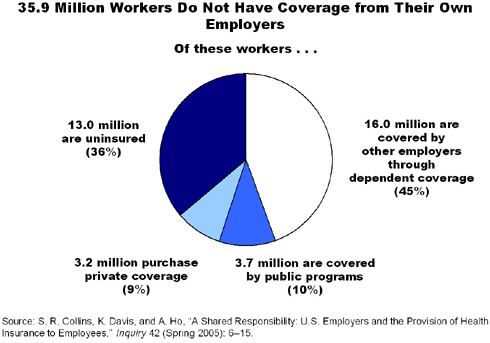When employers do not provide health coverage to their employees, those workers' medical costs are shifted elsewhere. According to a study by Commonwealth Fund researchers, most of the tab is picked up by other employers, who spend about $31 billion to cover these workers through dependent coverage—in addition to the estimated $150 billion they spend on their own workers' health costs. Public programs like Medicaid, meanwhile, spend $8 billion to help fill the gap.
Some workers fail to find coverage at all: between 2000 and 2003, the number of uninsured grew by 5 million, nearly all due to declining employer coverage.
In "A Shared Responsibility: U.S. Employers and the Provision of Health Insurance to Employees" (Inquiry, Spring 2005), the Fund's Sara R. Collins, Ph.D., Karen Davis, Ph.D., and Alice Ho warn that, if more U.S. companies eliminate coverage or make it less affordable for employees, job-based coverage may continue to decline.
According to the 2001 Medical Expenditure Panel Survey, 35.9 million of 112.8 million working Americans do not have coverage from their employers. Most (22 million) lack coverage because it is not offered to them, while 11.2 million decline to take it. 
Workers in small firms are at greatest risk: just 44 percent of workers in establishments with fewer than 25 employees have employer coverage. But a surprising number of workers in large companies also lack health benefits: among companies with 500 or more workers, over one-quarter of employees do not have employer coverage.
The authors suggest that tax credits or premium assistance would make coverage more affordable for low-wage workers. Another strategy, recently proposed by Senators John Kerry and Bill Frist, would be to reduce and stabilize premiums for smaller firms through reinsurance or stop-loss coverage. In addition, creating larger purchasing pools would give small businesses lower premiums and greater choice among plans, the authors say.
Some workers fail to find coverage at all: between 2000 and 2003, the number of uninsured grew by 5 million, nearly all due to declining employer coverage.
In "A Shared Responsibility: U.S. Employers and the Provision of Health Insurance to Employees" (Inquiry, Spring 2005), the Fund's Sara R. Collins, Ph.D., Karen Davis, Ph.D., and Alice Ho warn that, if more U.S. companies eliminate coverage or make it less affordable for employees, job-based coverage may continue to decline.
According to the 2001 Medical Expenditure Panel Survey, 35.9 million of 112.8 million working Americans do not have coverage from their employers. Most (22 million) lack coverage because it is not offered to them, while 11.2 million decline to take it.

Workers in small firms are at greatest risk: just 44 percent of workers in establishments with fewer than 25 employees have employer coverage. But a surprising number of workers in large companies also lack health benefits: among companies with 500 or more workers, over one-quarter of employees do not have employer coverage.
The authors suggest that tax credits or premium assistance would make coverage more affordable for low-wage workers. Another strategy, recently proposed by Senators John Kerry and Bill Frist, would be to reduce and stabilize premiums for smaller firms through reinsurance or stop-loss coverage. In addition, creating larger purchasing pools would give small businesses lower premiums and greater choice among plans, the authors say.